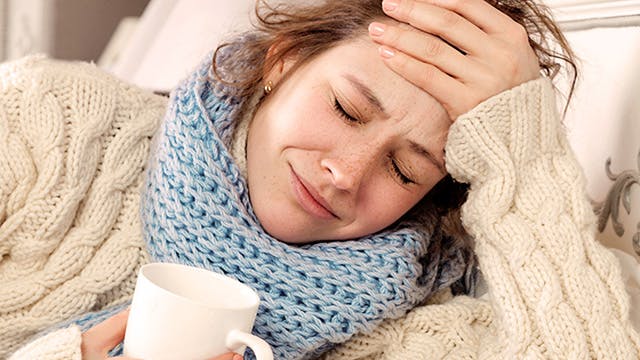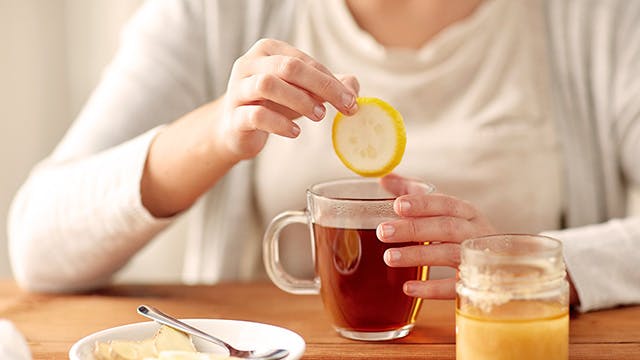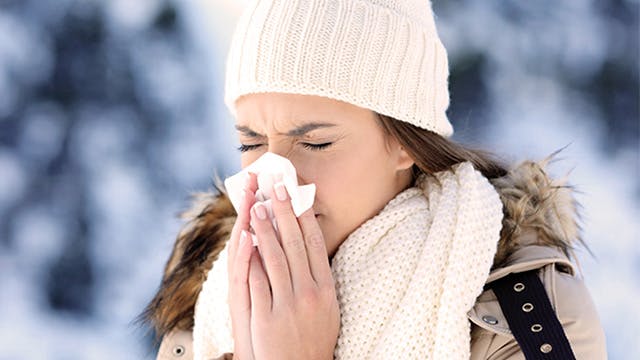What not to do when you have a cold or the flu
MYTH 1: Feed a cold and starve a fever (or vice versa)
What you should do instead: You may have heard at some point that you should feed a cold and starve a fever, or the other way around, but it’s not a good idea to stop eating when you’re sick. Even if you don’t have much of an appetite when you’re sick, you should still try to eat. Your body needs the right nutrients to fight off an infection, so it’s important to eat healthy to get healthy.
Foods that are hydrating and loaded with essential vitamins and antioxidants are the best foods to consume when you’re feeling sick. Fresh fruit contains many important vitamins, minerals, and antioxidants that your body needs, and eating fruit when you’re feeling under the weather can provide a nutrient boost as well as hydration.1 Try to eat plenty of fresh fruits or vegetables with nutritious properties to feed your body properly instead of starving off an infection.
MYTH 2: Take antibiotics to cure colds and flu
What you should do instead: Taking antibiotics to treat viral infections is highly discouraged because it can lead to antibiotic resistance, which occurs when bacteria change and become able to resist the effects of an antibiotic.2 The cold and flu are both caused by viruses, and while antibiotics are effective in treating bacterial infections, they have no effect on viral infections.
MYTH 3: Cold weather causes the flu
What you should do instead: It’s important to stay warm and bundled up when you feel unwell, so going out in the cold isn’t the best option when you’re sick. However, cold weather is not a direct cause of the flu. The only way to catch the flu is by being exposed to the influenza virus.3 Because flu season often coincides with cold weather, it’s not unusual to think that cold weather makes you sick.
MYTH 4: Drinking milk produces more mucus.
What you should do instead: Drinking milk may make your mucus thicker and more irritating to your throat than it would normally be, but it does not help to increase mucus production.4 It’s actually a good idea to drink milk or frozen dairy products when you’re sick. Frozen dairy products in particular can help soothe a sore throat and can be an easy way to add calories to your diet when it might be harder to eat.4
MYTH 5: The flu vaccine can give you the flu.
What you should do instead: It’s important to get the flu shot each year to protect yourself and prepare for the flu season. Many people are skeptical about receiving a flu shot each year because of the assumption that it can make you sick. Fortunately, the virus in the flu vaccine is inactive and can’t cause an infection.3 Vaccines take time to work, so if you feel sick immediately after receiving the vaccine, you were probably infected with the flu virus prior to getting the shot.
MYTH 6: Sweat it out.
What you should do instead: You may sweat a lot more when you’re sick, which can lead to dehydration. Dehydration can make you feel worse, so it’s important to drink lots of fluids to replenish what you sweat out. To avoid dehydration, steadily sip on hydrating fluids like water, tea, and sports drinks with electrolytes in them.1
While over-the-counter medicines like Theraflu can help to relieve symptoms, they can’t cure your illness. The best thing to do to recover is to continuously stay hydrated and let your body heal.
What you should do when you have a cold or the flu
FACT 1: Go for a steam
One of the best ways to be instantly relieved of congestion that comes with the flu or a cold is to breathe in some steam. Steam loosens mucus and can moisturize and soothe a sore throat.5 Step into a hot shower or boil some hot water to ease your breathing for a little bit. You can also have a humidifier on nearby to add some moisture to the air.
FACT 2: Gargle with salt water
A sore throat can be soothed by gargling with warm water mixed with salt. Simply dissolve ½ teaspoon of salt in a warm glass of water and gargle the concoction every three hours to relieve your sore throat.5 Warm salt water is a natural remedy that works to reduce the swelling in your throat.
FACT 3: Eat chicken soup
Chicken soup is good for the soul, and it’s also good for colds and flus as well. Although chicken soup cannot cure any illnesses, the warm broth can soothe your throat and keep you hydrated. Chicken soup is also a great way to get some food in your system while staying hydrated, as it is more filling than water and most beverages. If you aren’t a fan of chicken soup, you can sip on other hot broths to fill you up and ease your throat. Soup in general can act as a natural decongestant when served hot.1
FACT 4: Get plenty of rest
Getting plenty of sleep is important when you’re sick.6 Your body needs to sleep more when you’re sick because it’s working so hard to fight off infection. You should aim to get more sleep than you normally do to allow yourself to fully recover.
FACT 5: Take over-the-counter medicines to help combat symptoms
Because there is no immediate cure for a cold or the flu, the best thing to do is to rest up and take care of yourself while your body fights off the virus. You can also take over-the-counter medicines like Theraflu for powerful symptom relief to get you through the illness. For warming relief that helps keep you hydrated, try sipping a cup of Theraflu Multi-Symptom Severe Cold Hot Liquid Powder.
Use these do’s and don’ts to help you get through your cold or flu more efficiently. Consult with your doctor if you have any other concerns about what to do and what not to do when you’re sick.



